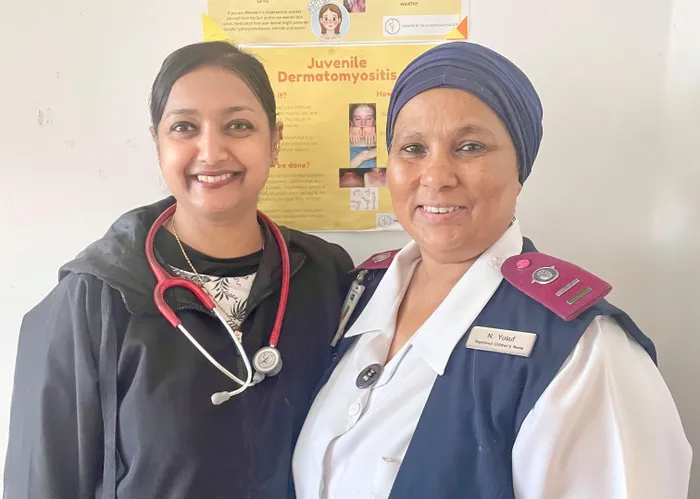Raising awareness about lupus

From left: Paediatric rheumatology and immunology specialist, Dr Deepthi Abraham, and professional nurse Nadia Yusuf.
Image: Supplied
“I was diagnosed with lupus at the age of 27, which presented itself as arthritis, skin rashes and features of neuro lupus,” said Dr Deepthi Raju Abraham, a paediatric rheumatology and immunology specialist at Tygerberg Hospital and the Faculty of Medicine and Health Sciences at Stellenbosch University.
She shared this as the Western Cape Department of Health and Wellness joined the world in raising awareness about systemic lupus erythematous (SLE), often known as lupus autoimmune disease.
Lupus is a long-term autoimmune disease in which the immune system attacks healthy tissue.
This complex autoimmune disease can affect anyone differently, affecting almost any part of the body, bringing with it a myriad of symptoms, such as fatigue, debilitating joint pain and skin rashes, according to Tygerberg Hospital's spokeswoman Laticia Pienaar.
The month of May is Lupus Awareness Month in South Africa and World Lupus Day was on Saturday May 10.
This year’s theme is: “Belonging. Belief. Breakthroughs”, which celebrates the strength and resilience of those living with lupus.
“As a paediatric rheumatologist/immunologist and a lupus warrior, I find myself uniquely positioned to understand the struggles and triumphs faced by my patients. Being a protagonist by nature and a positive, effective optimist in action, I truly believe I’m fortunate to have two perspectives,” Dr Abraham said.
She said living with lupus gave her a sense of purpose and acknowledged that every moment in life is both a miracle and an act of faith.
The hospital said lupus manifests differently in adults and children. Women, particularly those of childbearing age, are predominantly affected with fatigue, joint pain, skin rashes, and organ complications.
Children are more likely to experience serious complications, such as lupus nephritis and neuro-lupus but diagnosis in children can be delayed due to overlapping symptoms with other illnesses.
Advices for lupus patients, parents and caregivers:
- Educate yourself as caregivers: Understanding lupus, its symptoms, and treatment options is crucial. This knowledge will help you make informed decisions and advocate for your child’s health.
- Regular medical care: Ensure your child has regular check-ups with a paediatric rheumatologist. Consistent monitoring can help manage the disease effectively to monitor and review response to treatment and screen for side effects or worsening of disease.
- Medication management: Follow the prescribed treatment plan closely. Be aware of potential side effects and communicate any concerns to your healthcare provider.
- Promote a healthy lifestyle: Encourage and support nurture a balanced diet, regular exercise, and sufficient sleep. These habits can help strengthen your child’s overall health and immune system. Doing it together as a family helps promote compliance.
- Sun protection: Since sun exposure can trigger lupus flares, ensure your child wears sunblock, protective clothing, and seeks shade when outdoors. Apply during the day sunscreen four hourly. Remember it wears out too.
- Emotional support: Children with lupus may experience anxiety or depression. Provide emotional support and consider counselling or support groups for both your child and the family. Empower them to become lupus warriors.
- Monitor symptoms: Keep a diary of your child’s symptoms, triggers, and any changes in their condition. This information can be valuable for healthcare providers.
- Encourage open communication: Foster an environment where your child feels comfortable discussing their feelings and any challenges they face due to lupus.
- Be prepared for flares: Understand that lupus can have flare-ups. Be prepared with a plan for managing these episodes, including how to adjust activities as needed.
- Connect with others: Join support groups or online communities for parents of children with lupus. Sharing experiences can provide emotional support and valuable resources, for example, Andrea’s Arthritis Foundation South Africa, or Arthritis Association South Africa.
Related Topics: